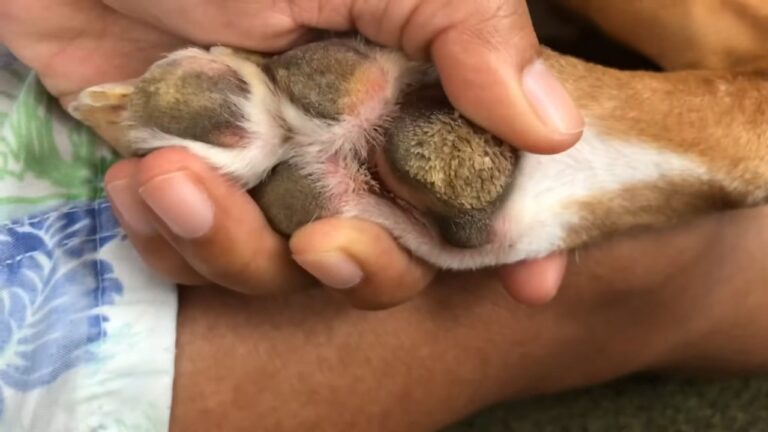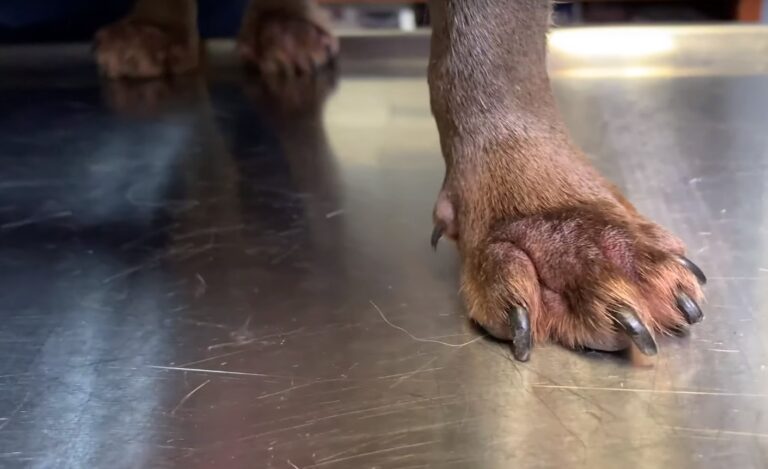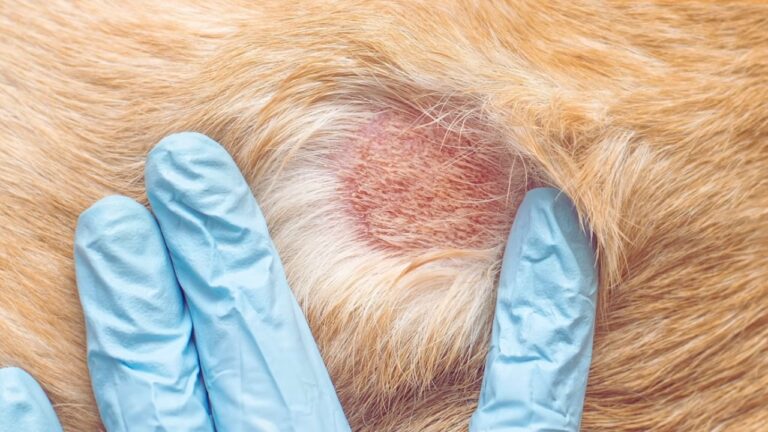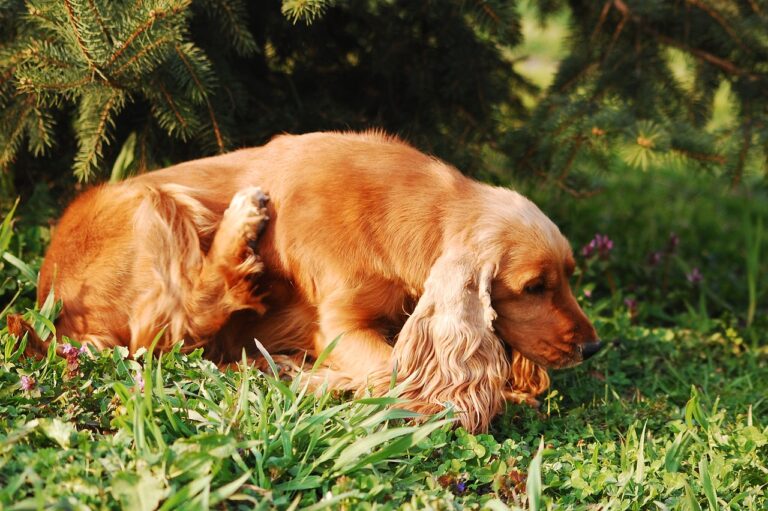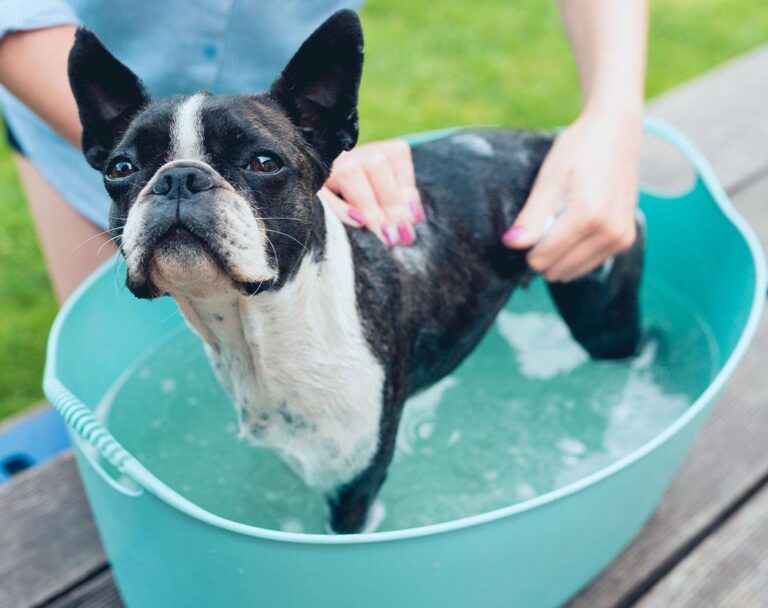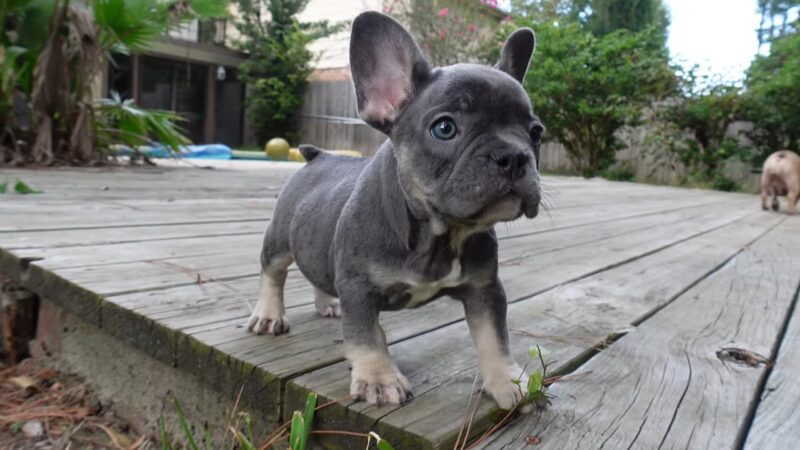There is some sort of consensus when it comes to what the cutest puppies are. Most people will immediately say French Bulldogs.
Behind those cute faces are puppies that require utmost care, especially in the first couple of weeks after they are born.
These things are usually very touchy, and you need to be extremely careful.
To make it easy for you to become a breeder, I will enlist several steps you must pay attention to to ensure they will grow healthy.
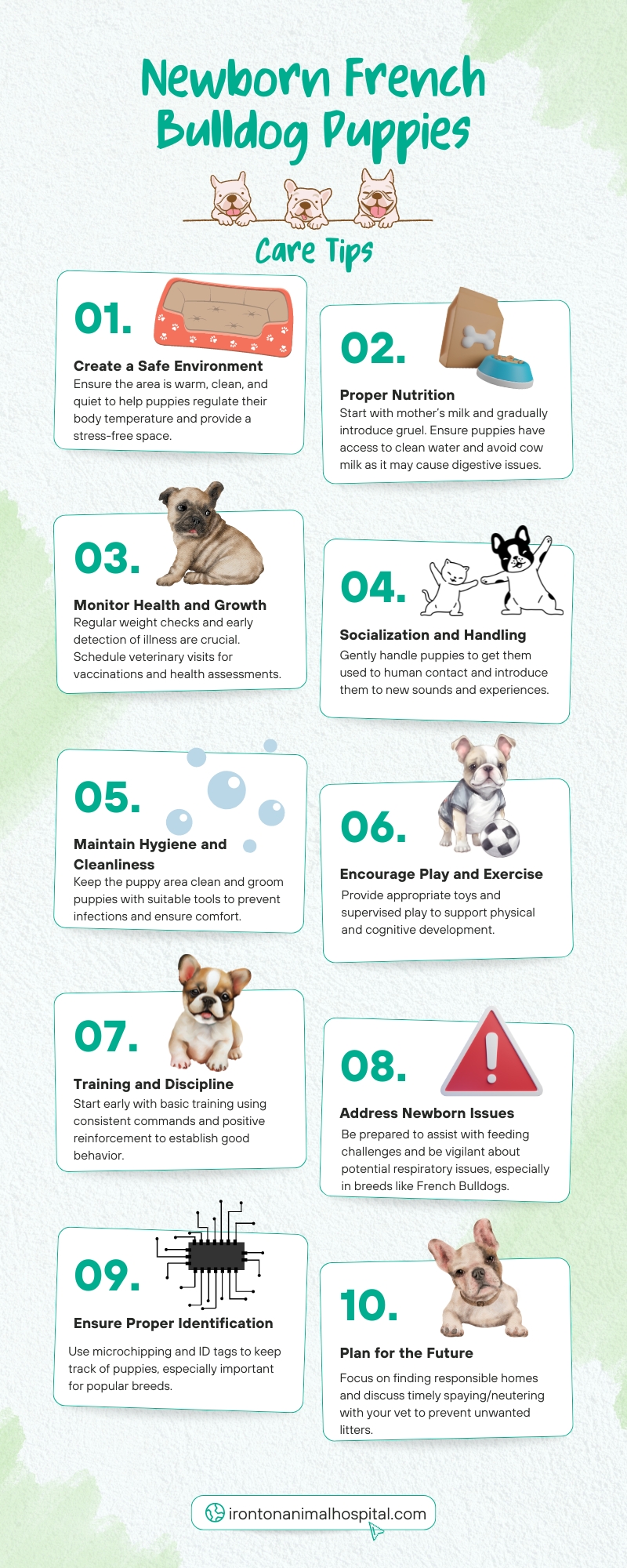
1. Making a Safe Environment

Making sure the puppies arrive to a safe and comfortable environment is the prerogative to their well-being and future development.
To do it properly, choose an area where they will spend their time with their mother. The place should have a couple of factors, like:
- Warm
- Clean
- Quiet
The reason why keeping the temperature is that puppies cannot regulate their body temperature for a couple of weeks. They need your help.
Keeping the temperature of the space at kind of 85°F (29°C) will do the work, at least for the first week.
Later, you could start decreasing the temperature regularly until it reaches around 75°F (24°C) with the aid of the quit of the month
Factors to Consider for Bedding
Newborn puppies spend most of their time sleeping; hence, comfortable bedding is vital.
- Choose soft and absorbent materials. Towels, fleece, or vet beddings are ideal.
- Do not add materials that are easily shredded or swallowed.
- Bedding should be easily washed because cleanliness is essential to prevent infections.
2. Nutrition
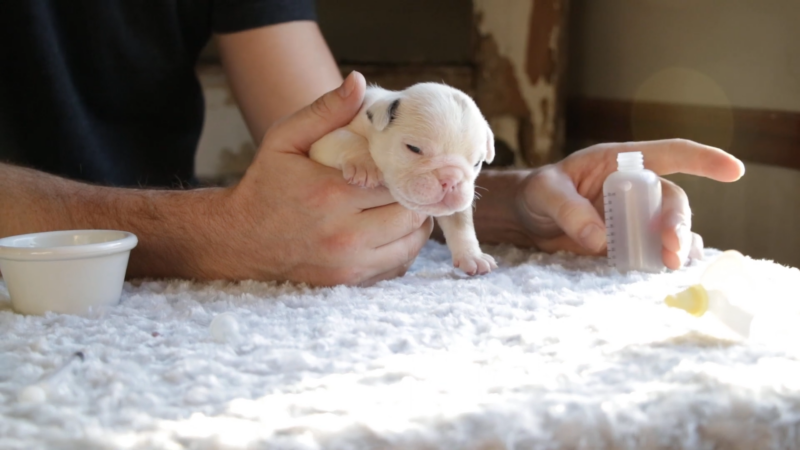
The next factor that requires your attention is feeding the little friends properly.
For the first month, mother’s milk presents all the essential vitamins the dogs need. Track feeding periods to make certain all puppies receives an adequate percentage.
From the third week, you can start introducing gruel – a mix of puppy milk replacers and high-quality puppy food. This transition should be gradual.
As the puppies start transitioning to solid food, ensuring they’re properly hydrated becomes crucial.
- Always have a bowl of fresh water near, mainly once they start consuming solid meals.
- While overhydration is unusual, ensure they are not ingesting excessive portions fast
- Cow milk can be hard for dogs to digest and might cause diarrhea
3. Monitoring Health & Growth

Keeping a near eye at the puppies’ health and growth can help stumble across any problems early on.
- Weight Checks: Regularly weigh the puppies. Steady weight gain is a good sign. Any drastic weight loss or lack of growth should be addressed immediately.
- Look for Signs of Illness: Symptoms such as lethargy, refusal to feed, vomiting, or diarrhea should be taken seriously.
Routine Vet Checks
Consistent veterinary care ensures your puppies are on the right track.
- First Visit: Schedule their first vet visit within the first week of birth.
- Vaccinations: Discuss a vaccination schedule with your vet to protect against common canine diseases.
- Parasite Prevention: Talk to your vet about starting a deworming and flea prevention regimen.
4. Socialization and Handling
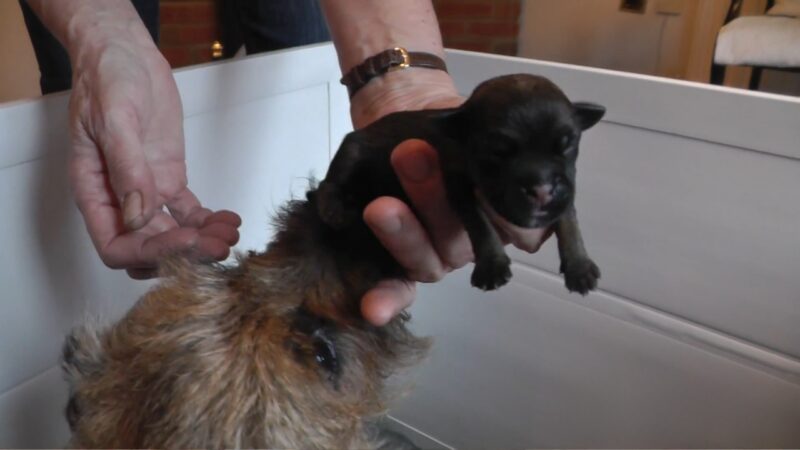
Early experiences can shape a puppy’s behavior in adulthood.
- Gentle Handling: Regularly handle the puppies, but do so gently. This can help them become accustomed to human touch.
- Introduce to New Sounds & Experiences: Gradually expose them to household sounds, other pets, and even car rides.
Positive Reinforcement
Using positive methods will foster trust and confidence.
- Rewards: When puppies show desired behaviors, reward them with treats or praise.
- Avoid Negative Techniques: Punishments can be detrimental to their development. Always opt for positive reinforcement techniques.
5. Hygiene and Cleanliness
Keeping your puppies clean is an irreplaceable factor for their future health and comfort.
- Regular Cleaning: Clean the puppy area daily. This minimizes the risk of infections.
- Bathing: Only bathe puppies if absolutely necessary, using puppy-safe shampoos.
Grooming Essentials
Starting grooming routines early can make the process easier as they grow.
- Brushing: Use soft brushes suitable for their delicate skin.
- Nail Trimming: Use puppy-specific nail clippers and be gentle. Regular trimming helps prevent overgrowth.
- Ear Cleaning: Use a damp cloth to clean the ears, being careful not to insert anything into the ear canal.
6. Play and Exercise

As puppies develop, play and exercise become critical for their bodily and mental improvement.
- Provide soft toys that are suitable for their size and age.
- Ensure play sessions are safe and supervised.
Engaging in activities can help with their cognitive development.
- Giving them toys that challenge them mentally can be beneficial.
- Create a safe space for them to explore, introducing new textures and obstacles.
7. Training and Discipline
Start basic training early to instill good behaviors.
- Consistency is Key: Ensure everyone in the household is consistent with commands and expectations.
- Potty Training: Begin as early as 3 weeks, using positive reinforcement to encourage desired behaviors.
Setting Boundaries
Establishing clear boundaries helps puppies understand what’s expected.
- Safe Zones: Define areas where puppies are allowed and areas that are off-limits.
- Redirect Unwanted Behaviors: Instead of scolding, redirect their attention to a positive activity or toy.
8. Dealing with Common Newborn Issues

Raising newborn French Bulldog puppies isn’t with out its challenges. Understanding common troubles assist you to navigate them effectively.
Some puppies might have hassle latching directly to their mom. In such instances, you would possibly need to help or do not forget bottle-feeding with a vet-recommended milk replacer.
French Bulldogs, due to their specific anatomy, would possibly face respiratory troubles. Always hold a watch out for symptoms of breathing misery.
Handling Separation Anxiety
Separation can be tough on both the mother and her dogs.
- Around 8 weeks, begin the process of separating the puppies from their mother, but do it gradually to reduce stress.
- Soft toys or blankets can provide comfort during this transition.
9. Importance of Identification
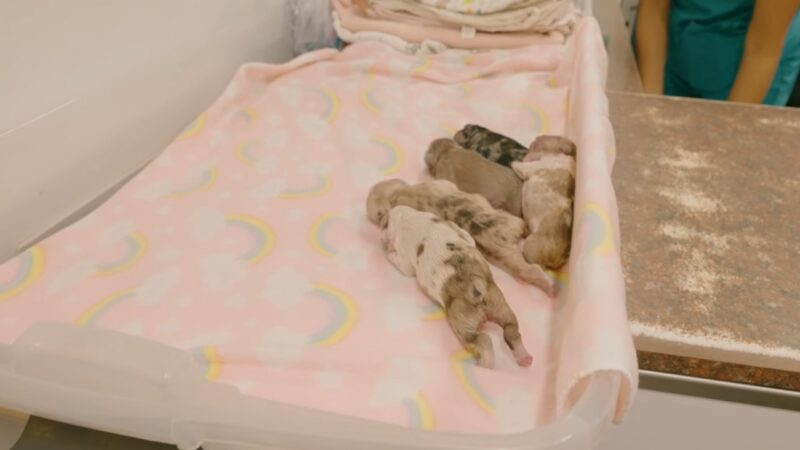
Given the growing popularity of French Bulldogs, making sure your puppies are without difficulty identifiable is important.
- Microchipping: This is a permanent form of identification. Discuss the best time to microchip your puppies with your vet.
- Collars and Tags: While they might be too young for collars, as they grow, ensure they wear one with an ID tag containing essential contact information.
- Custom Keychains: Dog tag keychains are best for puppy proprietors and can be effortlessly connected to keys or pet collars. You can customize dog tag keychains at keychains.co, and upload elements together with a customized brand, picture or name of the canine for a particular custom identity. And they’re no longer handiest of properly fine, but additionally long-lasting. Choosing a custom dog tag keychain to add fashion and personality to your dog!
Record Keeping
Maintaining detailed records can be beneficial for future reference.
- Growth Charts: Track weight, height, and other developmental milestones.
- Health Records: Keep a detailed record of vaccinations, vet visits, and any health issues or concerns.
10. Planning for the Future

Your responsibilities don’t end once the puppies are weaned and independent. Planning for their future is just as crucial.
- Finding Forever Homes: If you’re a breeder, ensure potential owners are well-informed and equipped to care for a Frenchie.
- Spaying/Neutering: Discuss with your vet the ideal age for this procedure to prevent unwanted litters and benefit the overall health of the puppy.
Continuous Learning
Dogs evolve, and so does the knowledge about their care.
- Stay Updated: Regularly consult vets, attend seminars, or join Frenchie communities to stay updated with the latest in canine care.
- Feedback Loop: If you’ve sold or given away puppies, keep in touch with the new owners. Their experiences can provide invaluable insights for future litters.
Summary
Being a French Bulldog breeder is a rocky road. Prepare yourself for numerous ups and downs. Still, seeing them grow and learn will make all the efforts you’ve invested worthwhile.
Having the right approach, supported by the right knowledge and passion, you will certainly ensure these pups have a good start of their lives.
If you are interested in numerous other subjects, like what you should do if your dog is stung by a bee, check other articles on our website.
Related Posts:
- 10 High Maintenance Needs of the French Bulldog -…
- Is a Fluffy French Bulldog Worth the Price Tag?…
- How to House Train an Adult Dog: Step-by-Step Guide 2024
- At Home Care for a Dog Eye Stye: When Your Dog Winks
- Gabapentin Dosage for Dogs - A Vet Reviewed Cheat…
- Are Acorns Poisonous to Dogs? - Signs of a Medical Emergency

